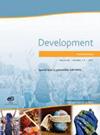发展中的过渡--周凡访谈录。
IF 3.7
2区 生物学
Q1 DEVELOPMENTAL BIOLOGY
引用次数: 0
摘要
周凡(Fan Zhou)是中国清华大学的一名小组负责人,研究早期胚胎发生过程中细胞命运转换的分子变化。我们在中厅会见了周凡,讨论了他迄今为止的职业道路。他谈到了本科毕业后一次偶然的基础研究机会如何激发了他对发育生物学的终生热情,以及他对技术开发的兴趣如何促进了他的独立研究。本文章由计算机程序翻译,如有差异,请以英文原文为准。
Transitions in development - an interview with Fan Zhou.
Fan Zhou is a group leader at Tsinghua University, China, where he works on the molecular changes that underpin cell fate transitions during early embryogenesis. We met with Fan over Zoom to discuss his career path so far. He discussed how a chance foray into basic research following his undergraduate degree sparked a lifelong passion for developmental biology, and how his interest in technology development has fed into his independent research.
求助全文
通过发布文献求助,成功后即可免费获取论文全文。
去求助
来源期刊

Development
生物-发育生物学
CiteScore
6.70
自引率
4.30%
发文量
433
审稿时长
3 months
期刊介绍:
Development’s scope covers all aspects of plant and animal development, including stem cell biology and regeneration. The single most important criterion for acceptance in Development is scientific excellence. Research papers (articles and reports) should therefore pose and test a significant hypothesis or address a significant question, and should provide novel perspectives that advance our understanding of development. We also encourage submission of papers that use computational methods or mathematical models to obtain significant new insights into developmental biology topics. Manuscripts that are descriptive in nature will be considered only when they lay important groundwork for a field and/or provide novel resources for understanding developmental processes of broad interest to the community.
Development includes a Techniques and Resources section for the publication of new methods, datasets, and other types of resources. Papers describing new techniques should include a proof-of-principle demonstration that the technique is valuable to the developmental biology community; they need not include in-depth follow-up analysis. The technique must be described in sufficient detail to be easily replicated by other investigators. Development will also consider protocol-type papers of exceptional interest to the community. We welcome submission of Resource papers, for example those reporting new databases, systems-level datasets, or genetic resources of major value to the developmental biology community. For all papers, the data or resource described must be made available to the community with minimal restrictions upon publication.
To aid navigability, Development has dedicated sections of the journal to stem cells & regeneration and to human development. The criteria for acceptance into these sections is identical to those outlined above. Authors and editors are encouraged to nominate appropriate manuscripts for inclusion in one of these sections.
 求助内容:
求助内容: 应助结果提醒方式:
应助结果提醒方式:


